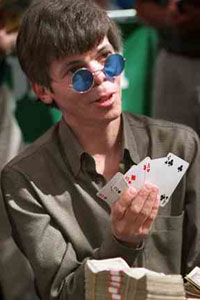 A really strange thing happened in my last major live tournaments. I began to completely distrust my reads, ignore my first instincts and began to feel that everyone must be 'at it'. As a result I ended up donking off chips with marginal calls of value bets and generally felt very dissatisfied that I was getting things so wrong.
A really strange thing happened in my last major live tournaments. I began to completely distrust my reads, ignore my first instincts and began to feel that everyone must be 'at it'. As a result I ended up donking off chips with marginal calls of value bets and generally felt very dissatisfied that I was getting things so wrong.
In the aftermath of my failures I am temporarily off the live scene with a mixture of family obligations and a painful hernia injury that requires rest to heal, both keeping me away. As usual in times where I have such a hiatus, I’ve taken to research and reflection. This time I am thinking about Poker Instincts, and in my case going back to 'Basic Instincts' to correct this new flaw in my game. I have enough old flaws without allowing new flaws to become ingrained!
As my observation skills developed and watching players became second nature, I began a while ago to get strong impulses when I had decisions to make. I would ‘feel’ that the player is strong or weak without having a specific ‘tell’ to give as evidence for this. I would 'sense' the right course of action without anything to go on but my subconscious, and more often than not I was right.
 Doyle Brunson writes about this in Super System 2 and discusses the notion of the subconscious in poker – that inescapable feeling that your opponent either has a certain hand or their holding is of a certain strength. Doyle’s conclusion is that there’s nothing strange about this. In fact it is your hours of observation at the table – all of which is stored in your subconscious – feeding back to you and telling you what your opponent has.
Doyle Brunson writes about this in Super System 2 and discusses the notion of the subconscious in poker – that inescapable feeling that your opponent either has a certain hand or their holding is of a certain strength. Doyle’s conclusion is that there’s nothing strange about this. In fact it is your hours of observation at the table – all of which is stored in your subconscious – feeding back to you and telling you what your opponent has.
It’s important to understand how we as humans take in information. We’re generally capable of receiving 10-15 inputs consciously each second – that is, things we are actively aware of. Subconsciously, however, we can take in literally millions of inputs each second. You’re taking in huge amounts of information without being aware of it and it’s all being stored for later use. We’ve all experienced it; for example, have you ever been at a party and heard your name in a conversation behind you but not heard the rest of the conversation? The reality is you have heard the rest of the conversation but haven’t processed it consciously because it isn’t relevant to you. Besides, your conscious mind is focused on the stunning girl you’re trying to convince yourself you have a chance with. Even if, as usual, the stunning girl is a 'no go', if you are like me you can always console yourself with the buffet!
So, back to the poker table – even though you may not have spotted a specific tell, your subconscious is picking up all kinds of micro-gestures and mini-tells from your opponent. Like a Jedi, you must become open to receiving this information and allowing your subconscious to feed this to you at the table.
The problem is we’re not used to doing this in day-to-day life. Our modern lives are dominated by conscious inputs – TV's, mobiles and so on, and we’ve lost this ability. A shocking example was provided by the Asian Tsunami disaster – tragically thousands of people died, but did you know that hardly any animal lives were lost? All of them fled the danger areas long before the wave hit. It’s because they’re much more in tune with all of the inputs from the world around them than we are.
The way to give yourself the best chance of accessing all the information you’re getting is to be as calm as possible at the poker table. Try to be almost Zen-like and tune out the clatter around you. Try to feel what your opponent is feeling. It may sound a bit 'new age', but with practice your reading ability will shoot up. Part of my problem in these recent competitions was that I was playing with good friends, with enjoyable table banter, but I do feel that by enjoying myself overtly I lost my reading ability. This is the first time I have felt this and it felt strange and frustrating.
 However, all of this 'staying in your zone' and all of your active observation at the table will be pointless if you don’t act on your instincts. You must listen to that little voice in your head that tells you you’re beaten and need to fold, or informs you that your foe is weak and you need to raise.
However, all of this 'staying in your zone' and all of your active observation at the table will be pointless if you don’t act on your instincts. You must listen to that little voice in your head that tells you you’re beaten and need to fold, or informs you that your foe is weak and you need to raise.
Beyond this, I can’t do anything more than hand you over to the greatest reader of players who’s ever lived – Stu Ungar – for the final word on this subject: "You have to know your reads are correct. If you can’t trust your instincts you have no chance at a table. No chance whatsoever."